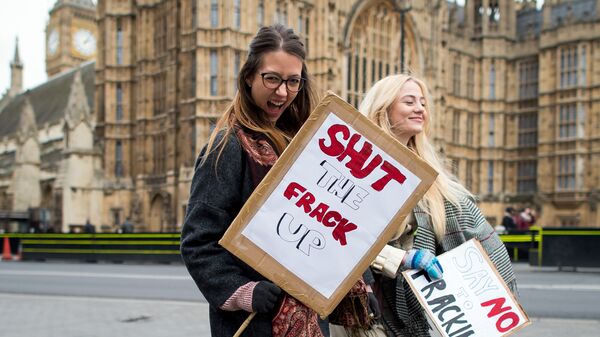Extraction and the use of shale gas has declined, according to a survey conducted by the University of Nottingham. Public favor has fallen from over 58 percent in July 2013 to just over 37 percent in October 2016.
For the first time, the survey has shown that support for fracking is declining in the UK. This news comes at a pivotal time in the UK shale gas debate as horizontal drilling has just been given government approval in Lancashire.
UK public support for #fracking at lowest level – Notts University poll. Plus review of INEOS parish surveys https://t.co/7574A9O1VG pic.twitter.com/fFwtiAz347
— Ruth Hayhurst (@ruthhayhurst) October 13, 2016
Sputnik spoke to Professor Sarah O'Hara from Nottingham University, pro-vice chancellor for education and student experience, who lead the survey.
Ms. O'Hara said that the results show a significant shift in what people are saying about fracking and that education is the key reason for this.
"People are beginning to learn, more about shell gas. When we first had the survey only 37 percent of people could identify shale gas and now more people are aware and they are saying they don't want it and that is driven more from women," Ms. O'Hara told Sputnik.
Why Europe is refusing to sign up for the fracking revolution https://t.co/pSNq6b43c2 pic.twitter.com/fRPz6gHGbB
— Bloomberg (@business) October 13, 2016
"The more information people had, the less they were willing to support the extraction of shale gas. We are getting activists who are good at getting this information out into social media and we are seeing this played back to us."
The survey's revelations that fracking is becoming unpopular amongst the general public, have opened up the debate into alternatives to shale gas. Ms. O'Hara said that when people were asked about a substitute to fracking, they were quite happy to use conventional gas instead.
"People don't understand that shale gas and conventional gas are one and the same thing and they are the same gas. Primarily people want renewables and that presents the government with a problem as we don't have enough of them. We use a lot of oil in the manufacturing base and you can't replace that with renewables," Ms. O'Hara told Sputnik.
"The desolate north speaks loud & clear, we don't want your fracking here!" Top chant at #secretshale summit #WeSaidNo
— Helen Rimmer (@HelenJqRimmer) October 11, 2016
Yes to renewables! pic.twitter.com/bTcPyVzHHv
The next step in the process would be to see how this survey will impact the government into making changes concerning fracking, however for Ms. O'Hara and her team at Nottingham University that was never the objective.
"I started the survey because I wanted to know how the public was responding to reports of shale gas and its extraction, as well as to look at the media representations of shale gas. The survey is not about focusing on who's for it and against it, it's just to show how people are proceeding with the issues at hand," Ms. O'Hara told Sputnik.
Ms. O'Hara is adamant however, that what we will see in regards protesting fracking will be very different from anything we have ever seen before.
"The protest will be very local and it will be women with children trying to prevent companies like iGas from fracking and extracting shale gas. It will be one that we are not used to."


